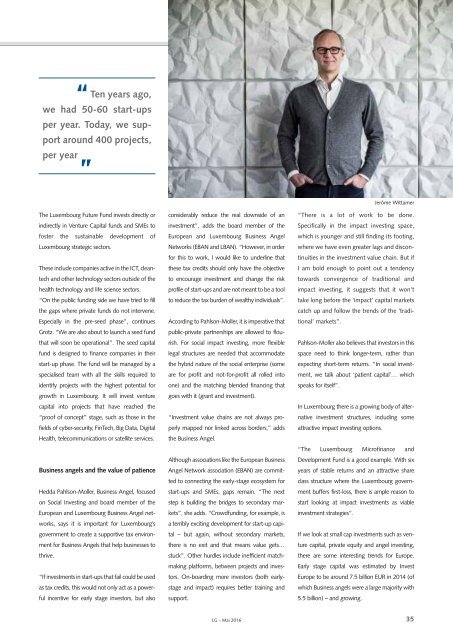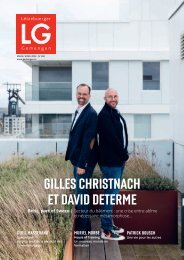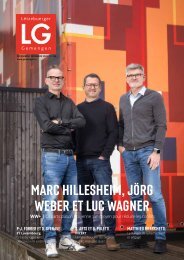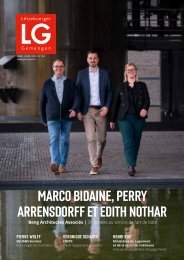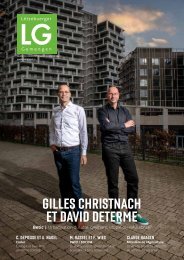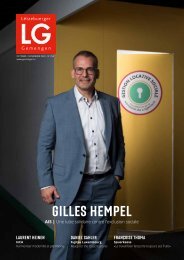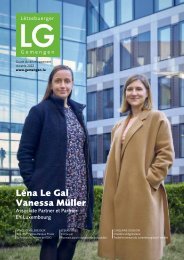LG 187
You also want an ePaper? Increase the reach of your titles
YUMPU automatically turns print PDFs into web optimized ePapers that Google loves.
Ten years ago,<br />
we had 50-60 start-ups<br />
per year. Today, we support<br />
around 400 projects,<br />
per year<br />
“<br />
”<br />
The Luxembourg Future Fund invests directly or<br />
indirectly in Venture Capital funds and SMEs to<br />
foster the sustainable development of<br />
Luxembourg strategic sectors.<br />
These include companies active in the ICT, cleantech<br />
and other technology sectors outside of the<br />
health technology and life science sectors.<br />
“On the public funding side we have tried to fill<br />
the gaps where private funds do not intervene.<br />
Especially in the pre-seed phase”, continues<br />
Grotz. “We are also about to launch a seed fund<br />
that will soon be operational”. The seed capital<br />
fund is designed to finance companies in their<br />
start-up phase. The fund will be managed by a<br />
specialised team with all the skills required to<br />
identify projects with the highest potential for<br />
growth in Luxembourg. It will invest venture<br />
capital into projects that have reached the<br />
“proof of concept” stage, such as those in the<br />
fields of cyber-security,FinTech, Big Data, Digital<br />
Health, telecommunications or satellite services.<br />
Business angels and the value of patience<br />
Hedda Pahlson-Moller, Business Angel, focused<br />
on Social Investing and board member of the<br />
European and Luxembourg Business Angel networks,<br />
says it is important for Luxembourg’s<br />
government to create a supportive tax environment<br />
for Business Angels that help businesses to<br />
thrive.<br />
“If investments in start-ups that fail could be used<br />
as tax credits, this would not only act as a powerful<br />
incentive for early stage investors, but also<br />
©Mike Zenari<br />
considerably reduce the real downside of an<br />
investment”, adds the board member of the<br />
European and Luxembourg Business Angel<br />
Networks (EBAN and LBAN). “However, in order<br />
for this to work, I would like to underline that<br />
these tax credits should only have the objective<br />
to encourage investment and change the risk<br />
profile of start-ups and are not meant to be a tool<br />
to reduce the tax burden of wealthy individuals”.<br />
According to Pahlson-Moller,it is imperative that<br />
public-private partnerships are allowed to flourish.<br />
For social impact investing, more flexible<br />
legal structures are needed that accommodate<br />
the hybrid nature of the social enterprise (some<br />
are for profit and not-for-profit all rolled into<br />
one) and the matching blended financing that<br />
goes with it (grant and investment).<br />
“Investment value chains are not always properly<br />
mapped nor linked across borders,” adds<br />
the Business Angel.<br />
Although associations like the European Business<br />
Angel Network association (EBAN) are committed<br />
to connecting the early-stage ecosystem for<br />
start-ups and SMEs, gaps remain. “The next<br />
step is building the bridges to secondary markets”,<br />
she adds. “Crowdfunding, for example, is<br />
aterribly exciting development for start-up capital<br />
– but again, without secondary markets,<br />
there is no exit and that means value gets…<br />
stuck”. Other hurdles include inefficient matchmaking<br />
platforms, between projects and investors.<br />
On-boarding more investors (both earlystage<br />
and impact) requires better training and<br />
support.<br />
Jerôme Wittamer<br />
“There is a lot of work to be done.<br />
Specifically in the impact investing space,<br />
which is younger and still finding its footing,<br />
where we have even greater lags and discontinuities<br />
in the investment value chain. But if<br />
Iam bold enough to point out a tendency<br />
towards convergence of traditional and<br />
impact investing, it suggests that it won’t<br />
take long before the ‘impact’ capital markets<br />
catch up and follow the trends of the ‘traditional’<br />
markets”.<br />
Pahlson-Moller also believes that investors in this<br />
space need to think longer-term, rather than<br />
expecting short-term returns. “In social investment,<br />
we talk about ‘patient capital’… which<br />
speaks for itself”.<br />
In Luxembourgthere is a growing body of alternative<br />
investment structures, including some<br />
attractive impact investing options.<br />
“The Luxembourg Microfinance and<br />
Development Fund is a good example. With six<br />
years of stable returns and an attractive share<br />
class structure where the Luxembourg government<br />
buffers first-loss, there is ample reason to<br />
start looking at impact investments as viable<br />
investment strategies”.<br />
If we look at small cap investments such as venture<br />
capital, private equity and angel investing,<br />
there are some interesting trends for Europe.<br />
Early stage capital was estimated by Invest<br />
Europe to be around 7.5 billion EUR in 2014 (of<br />
which Business angels werealarge majority with<br />
5.5 billion) – and growing.<br />
<strong>LG</strong> - Mai 2016<br />
35


